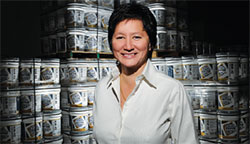Government is a reliable resource for Canadian manufacturers that depend on exports
When Kari Yuers’ father sought out new export opportunities in the 1970s and ’80s, he began by buying a one-way ticket to a far-flung destination. Once there, he pounded the pavement for as long as it took to make a deal.
“He didn’t buy a return flight until he’d sold something,” said Yuers, chief executive officer of the family business, Kryton International. The company makes a concrete waterproofing product out of its facility in southeast Vancouver.
Ron Yuers’ first stop was always the local office for Canada’s Department of Foreign Affairs, Trade and Development(DFATD), where he would get information about the local market.

Kari Yuers co-owns Vancouver-based Kryton International. Using government resources is a good first step when developing new markets abroad.
“If he was really good, he would get them to lend him their car so that he could show up with the fancy car with the [Canadian] flags on the front of it, so he looked really important,” Yuers said.
While in-person meetings are still important, much more of the legwork now gets done ahead of time, including market research and initial contacts with potential clients. Kryton now does business in the Middle East, Asia, Europe and the United States.
One thing that hasn’t changed? Savvy exporters know to make full use of the Canadian government resources available.
“The DFATD offices are all over, and [we] would try to make connections with certain DFATD officers and get them to help [us] understand or evaluate the area and the opportunities, and then make connections,” Yuers said, speaking of the company’s successful attempt to break into the Middle East construction market in the early 2000s.
For most Canadian manufacturers, whether small, medium or large, exporting isn’t an option, it’s a must, said MarcusEwert-Johns, vice-president of the B.C. chapter of the Canadian Manufacturers and Exporters (CME) association.
“Given the size of the Canadian economy, given the size of the provincial economy, you have to export,” Ewert-Johns said. “It’s the only way to make money.”
But many businesses are still unaware of the government help available. It’s a problem identified by the Canadian Chamber of Commerce. The business advocacy organization recently released a report calling on the government to increase its diplomatic presence abroad and co-ordinate export services, which are currently spread across several different government departments and not well advertised.
The chamber warns that if Canada doesn’t work to build what it says is a weak international brand, the country won’t be able to take full advantage of recently signed trade agreements with Europe and Korea.
Government services can range from identifying the most likely companies to be open to a pitch – reducing the time a Canadian company needs to spend cold-calling – to troubleshooting a foreign government’s regulations, the best way to structure your company to operate in a country like China, or how to negotiate a conflict zone.
“You want to have these government guys on your side in a lot of these markets because the stature of government is critical in a lot of these countries,” Ewert-Johns said.
The federal government has now started a program to place trade commissioners in 25 industry associations across the country in order to better connect business with export opportunities. Trade commissioner Carl St-Laurent will be stationed in the CME’s office for the next three years, Ewert-Johns said.